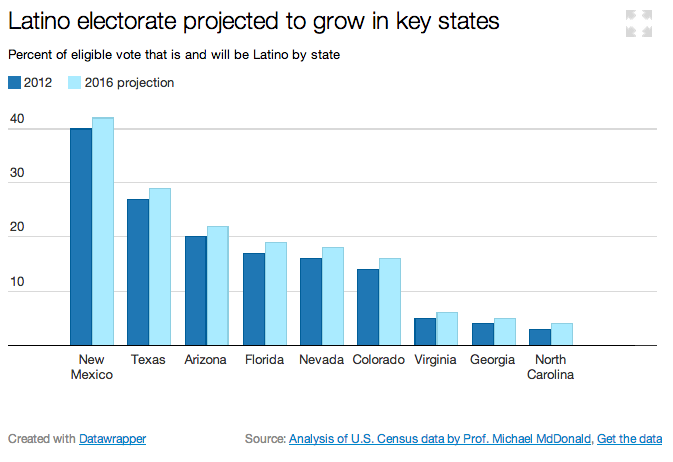At the Washington Post today, Greg Sargent presents a new analysis by Michael McDonald at the United States Elections project, which finds that the Latino vote from 2012-2016 will rise by two percentage points in Florida, Colorado, Nevada, New Mexico, Texas, and Arizona — and one percentage point in Virginia, Georgia, and North Carolina. Here’s the chart:
This means that slow but steady, a Latino advantage is being baked into the demographic cake, and both Democrats and Republicans will have big incentives to court this electorate. For example, as we’ve said in our recent state polling, Texas and Arizona might be solid red states now, but that’s slowly changing. Republicans who don’t realize that they have to broaden their tent — by passing, for instance, immigration reform — are digging their heads into the sand.
Pollster Whit Ayres and analyst Jennifer Duffy, quoted in the Greg Sargent article, agree:
GOP pollster Whit Ayres, who favors reform, tells me Republicans should take the two point rise in critical swing states very seriously.
“It’s significant,” Ayres says. “Some aspects of the future are difficult to see clearly. The increasing proportion of Hispanics in the electorates in key swing states is not one of them.”
“Swing states are by their very definition closely contested,” Ayres continues. “Many of them have been won in close races by only a percentage point or two. Changing the demographics of the state by two percentage points puts a finger on the scale in each of the swing states for the party that’s doing well among Hispanics. This underscores the critical importance for Republican candidates to do better among nonwhite Americans, particularly among Hispanics, if Republicans ever hope to elect another president.”
Ayres adds that the one-point rises also matter. “It is a sign of things to come,” he said. “States that have been comfortably red, like Georgia and North Carolina, are changing, and will become swing states unless Republicans figure out how to win significant support in the Hispanic community.”
Jennifer Duffy, who analyses Senate races for the non-partisan Cook Political Report, says such changes could even impact 2016 Senate contests. Even if Republicans win a slim Senate majority this year, Cook projects that in 2016, Republicans will be on defense in many more races, amid a more diverse presidential year electorate. There will be contested races in Florida (Marco Rubio); North Carolina (Richard Burr), and possibly Arizona (especially if John McCain retires).
“In 2016, Republicans have to defend pretty hostile territory, and the fact that it’s a presidential year will only make it worse,” Duffy tells me. “All of that could be made much more serious if Republicans don’t address immigration in some way. In a lot of these states, if Republicans win on the strength of the white vote, they may not be able to count on that again in 2016. This is true for even someone like Marco Rubio. The longer Republicans stall on immigration, the harder it is going to be for them.”


